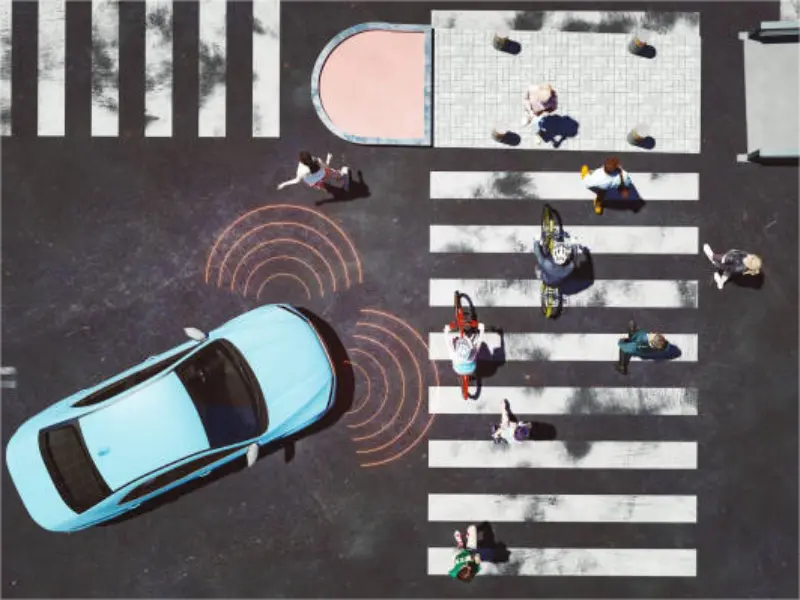- Smart cities improve daily life with real-time data for better traffic, security and environmental management.
- They stimulate economic growth by attracting business and investment through advanced infrastructure and connectivity.
- Innovative technologies in smart cities improve healthcare, education and governance, enhancing the quality of life for all residents.
Smart cities use technology and data to improve the quality of life for their residents. Smart cities are revolutionising urban life by integrating advanced technologies to manage everything from traffic and security to energy and waste. They use real-time data to improve efficiency and sustainability, leading to improved public services and quality of life.
With benefits ranging from economic growth to improved healthcare and environmental sustainability, smart cities represent the future of urban development and are poised to address some of today’s most pressing challenges.
1. Improved transport systems
Smart cities use real-time data from sensors, GPS and cameras to optimise traffic flow, reduce congestion and improve public transport efficiency through accurate vehicle tracking and intelligent traffic signals. These improvements reduce commute times and traffic headaches for citizens.
2. Enhanced public safety
Advanced surveillance, gunshot detection systems and predictive analytics help law enforcement respond more effectively. Intelligent emergency response platforms analyse sensor data to dispatch first responders in a more timely manner. Citizens feel safer with lower crime rates due to advanced threat detection and faster emergency response times.
3. Greater energy efficiency
Smart grids monitor and manage energy consumption, integrate renewable energy, and implement energy-efficient building designs to reduce costs and environmental impact. As a result, citizens enjoy lower utility bills and smaller carbon footprints, thanks to technology-enabled conservation and efficiency.
4. Advanced waste management
Sensor-enabled smart bins optimise collection routes and schedules, while automated sorting facilities increase recycling rates and reduce emissions. The optimisation of collection routes has the potential to reduce the carbon footprint of waste management vehicles. By preventing the accumulation of waste on streets and in landfills, it can contribute to the creation of cleaner and healthier urban environments for citizens.
5. Improved quality of life
The integration of technology into city infrastructure provides citizens with access to a range of services and amenities that facilitate an enhanced quality of day-to-day living. Smart assistants are capable of responding to queries and handling notifications, while environmental sensors are able to monitor and improve air and water quality. Integrated data dashboards provide visibility into community services, and these smart services collectively elevate living standards.
Also read: Smart home devices: Luxuries or necessities?
Also read: Cases of big data in daily life
6. Economic growth and development
Smart cities attract business and investment with their advanced connectivity and infrastructure, creating new jobs and fostering economic development in both traditional and emerging industries.
7. Innovative healthcare solutions
Smart healthcare systems use telemedicine and remote monitoring to expand access to care, improve diagnostic accuracy and enhance disease surveillance, benefiting public health.
8. Environmental sustainability
Sensor networks are employed to monitor air quality and water consumption, with the deployment of smart technologies facilitating the optimisation of resource utilisation and the promotion of sustainable practices across the city.
9. Effective governance
The utilisation of digital platforms and e-governance solutions has the potential to enhance accessibility to public services, promote greater transparency and facilitate citizen engagement in the governance process.
10. Real-time data utilisation
The generation of vast amounts of data by IoT devices offers significant potential for the advancement of urban planning and management through the provision of valuable insights derived from big data analytics. This, in turn, can facilitate enhanced responsiveness to a range of urban challenges.
11. Robust communication networks
The provision of free, high-speed wireless internet access throughout public spaces is a key feature of smart cities, facilitating increased connectivity. The deployment of sensors and the construction of supporting infrastructure facilitate the provision of fast and reliable mobile broadband services. Enhanced networks facilitate greater customer reach for businesses and enable innovations that rely on connectivity.
12. Educational enhancements
The utilisation of interactive smart boards serves to enhance the quality of in-classroom teaching, while online portals facilitate access to learning resources outside of normal teaching hours. Digital libraries offer a vast array of materials and remote access. The use of shared datasets is conducive to the development of analytical skills and STEM education. These technologies provides students with invaluable knowledge and tools that will be beneficial in their future en

